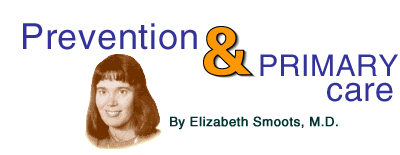
Dietary Discoveries for
a Healthier Heart
Part I: vitamin E, vitamin C, and folate
In the land of plenty, many Americans have grown accustomed to
eating far too much fatty food. But it's become increasingly difficult
to ignore the warnings of health professionals: a high-fat diet
can lead to disaster, in the form of hardening of the arteries,
a stroke, or a heart attack.
For heart health, nutrition experts now recommend that people
eat a diet low in cholesterol and saturated fat, with less than
30 percent of total calories coming from fat. In addition to exercise
and weight control, several dietary measures have been added to
the preventive arsenal for the war against heart disease.
Current research suggests that your risk of heart disease may
increase if you are deficient in certain vitamins. Along with
others, vitamin E, vitamin C, and folate help protect your arteries
from attacks by free radicals and other reactive molecules. If
these vitamins are not present in sufficient amounts, highly charged
oxygen can turn cholesterol into oxidized cholesterol. Studies
show that oxidized cholesterol is very toxic to arterial walls
and may promote the rapid buildup of a fatty material called plaque.
This plaque may rupture or completely block a coronary artery,
resulting in a heart attack.
Antioxidant vitamins
Vitamin E
As an antioxidant, vitamin E may help reduce your risk of heart
disease in several ways. First, it shields your arteries from
the damaging effects of free radicals. The vitamin also seems
to help prevent the formation of blood clots that may trigger
a heart attack. In a controlled trial of patients with heart disease,
there was a 77 percent reduced incidence of nonfatal heart attacks
among patients who took vitamin E for more than a year. The vitamin
did not significantly reduce overall deaths, however.
Based on current evidence, experts recommend that people with
heart disease consume 400 international units (IU) of vitamin
E daily. Food sources include vegetable oils, seeds, nuts, brown
rice, and wheat germ. Be sure to consult with your health care
provider before taking supplements -- especially if you're taking
blood thinners or blood-pressure pills, which may interact with
vitamin E and cause bleeding problems.
Vitamin C
Preliminary data show that vitamin C, another antioxidant, seems
to work with vitamin E to prevent blocked arteries. One study
following 11,349 American men and women over ten years found that
those with the highest intake of vitamin C had the lowest rate
of heart disease. The best sources are fresh citrus, broccoli,
strawberries, and tomatoes. Up to 1 gram of vitamin C a day is
recommended.
B-complex vitamins
Vitamin B-6, vitamin B-12, and folate are involved in the metabolism
of homocysteine, a product of the breakdown of certain proteins.
A deficiency of these B vitamins may lead to the toxic accumulation
of homocysteine. Excess levels can damage artery walls, causing
plaque formation, blood clots, and a buildup of oxidized cholesterol.
Scientists are studying whether homocysteine reduction helps
prevent heart disease. In the meantime, the American Heart Association
recommends lowering your levels by consuming adequate amounts
of B vitamins -- especially folate. When choosing food sources,
think foliage -- leafy greens such as spinach, kale, broccoli,
and asparagus are high in folate. The vitamin is also plentiful
in yellow fruits and vegetables -- such as yams, citrus, and cantaloupe
-- as well as in legumes, wheat germ, and whole grains. In addition,
all grain and cereal products are now fortified with folate to
help prevent neural-tube birth defects.
For heart health, experts recommend consuming 400 micrograms
of folate daily. Don't take B-vitamin supplements without your
provider's approval, however. Folate may mask nerve disease caused
by B-12 deficiency (called pernicious anemia).
In Part II Dr. Smoots will discuss more dietary discoveries for
a healthier heart, including soy, seafood, phytochemicals, fiber,
and garlic.
Elizabeth Smoots, M.D., F.A.A.F.P., is a board-certified
family physician in Seattle, Washington. A fellow of the American
Academy of Family Physicians, Dr. Smoots specializes in prevention
and primary care medicine.

